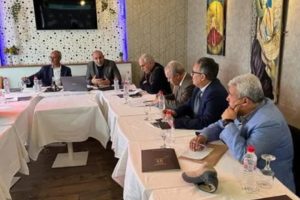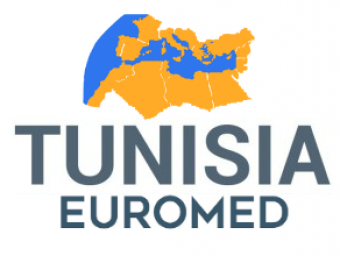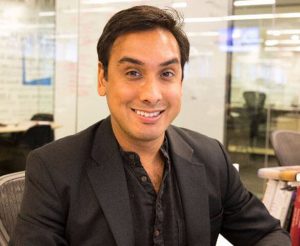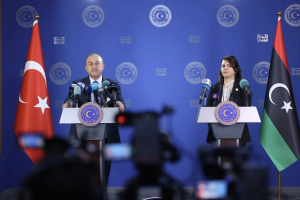This image supplied by the Iran International Photo Agency shows a view of the reactor building at the Russian-built Bushehr nuclear power plant in August 2010 in Iran. (IIPA/Getty Images)
This image supplied by the Iran International Photo Agency shows a view of the reactor building at the Russian-built Bushehr nuclear power plant in August 2010 in Iran. (IIPA/Getty Images)
After almost 17 months of diplomatic wrangling, there could be glimmers of hope for a nuclear deal with Iran. On Wednesday, U.S. officials said they had sent back a response to Iranian comments on a E.U.-led draft agreement that would salvage the 2015 agreement over Tehran’s nuclear program. The trading of response documents could precede another round of talks in Vienna aimed at restoring the terms of the original deal, which placed hard curbs on Iran’s ability to enrich fissile material to weapons-grade levels in return for sanctions relief.
Those terms were unilaterally broken in 2018 by former president Donald Trump, who rejected the pact forged by the Obama administration and other international powers even as Iran was believed to be abiding by its restrictions. That move was opposed by the deal’s European, Chinese and Russian signatories, but cheered on by a clutch of regional powers united in their animus toward Iran — including Israel, then led by right-wing prime minister Benjamin Netanyahu, and the Arab monarchies in Saudi Arabia and the United Arab Emirates.
The Trump administration, at the time, claimed Iran wouldn’t dare restart its forbidden nuclear activity. But by 2019, shorn of incentives not to, Iran installed faster centrifuges in its facilities and commenced enrichment activities that violated the agreement’s strictures. Under the 2015 deal, the so-called “breakout” time for Iran to create enough for fuel for a potential nuclear bomb was measured in months, even close to a year. Now, it’s a matter of weeks, officials and analysts claim.
Biden came to office in 2021 vowing to return to the agreement and rein back Iran’s enrichment surge. But domestic politics intervened in both countries — an immediate deal with sanctions relief for Iran was a non-starter in Washington, while hard-liners in Tehran, who long opposed the original deal and doubted the worth of any diplomacy with the Americans, swept away the regime’s so-called “reformist-pragmatist” camp in elections. Polling of Iranian attitudes this summer found that fewer than half of the Iranians surveyed believe the deal will be restored, while more than two-thirds expressed doubt that the United States would abide by its commitments.
Robert Malley, Biden’s special envoy for Iran, warned late last year in an interview with the New Yorker that the Iranians were “emptying the deal of the nonproliferation benefits for which we bargained.” He acknowledged that at some future point diplomacy on this matter would “be tantamount to trying to revive a dead corpse.”
Evidently, the Biden administration doesn’t believe we’ve reached that stage yet. But the prospect of the deal’s restoration has revived the angry debates surrounding its initial brokering. Republican lawmakers have expressed their outrage over any agreement that doesn’t have congressional oversight. David Barnea, chief of the Mossad, Israel’s foreign intelligence agency, was quoted by Israeli media on Thursday warning that a looming deal would be “a strategic disaster.” A flurry of comments from Israel’s political elites, including Prime Minister Yair Lapid, urged the United States to back away from the negotiating table.
There’s no small irony to their current objections. Trump broke the accord in 2018 with Netanyahu’s goading even amid “a clear consensus within Israel’s security and defense establishment at the time that leaving the agreement was a giant error,” wrote Haaretz journalist Amir Tibon. Now, he added, it may be replaced by an agreement that “some experts warn … will be worse for Israel and create a more dangerous Middle East.”
“Israel, and opponents of a new deal in Congress, have said that the lifting of nuclear-related sanctions will provide Iran with hundreds of billions of dollars to finance terrorist activities, and the early expiration of some of its provisions will quickly allow Iran to revive plans to manufacture a nuclear weapon,” my colleague Karen DeYoung reported.
“Administration officials dispute the dollar calculations and say that the reinstatement of limits on the Iranian nuclear program, even with some expiration dates, will provide several years’ relief from an imminent nuclear threat and room for further negotiations,” she added.
The Trump administration and its fellow travelers who took a hammer to the agreement are reaping what they sowed. “Their actions not only almost prompted a war, but as a result of the Trump administration’s poor decision-making, Iran expanded its nuclear program in an unprecedented manner,” Holly Dagres, a senior fellow at the Atlantic Council, told me. “Love or hate the JCPOA” — the acronym for the 2015 agreement between Iran and world powers — “it’s the best path forward at preventing Iran from potentially developing nuclear weapons.”
Had Trump not withdrawn from the deal, Dagres added, the inherent “confidence-building exercise” that the JCPOA entailed would have continued, perhaps leading to negotiations on other fronts. “Whether those discussions would’ve been constructive is unclear, but it’s safe to say that Iran would not be considered a nuclear threshold state as it is by some today,” she said.
Yet there’s a parallel sense that hawks in Washington got exactly what they wanted. “On its own terms, [the Trump administration’s decision to leave the deal] has been very successful,” argued John Ghazvinian, director of the University of Pennsylvania’s Middle East Center.
It scrapped any prospect of rapprochement between Tehran and Washington, tightened cooperation between Israel and the U.S.’s Gulf allies and raised the likelihood of future covert Israeli or even American action against Iran. New tensions came to the fore and defined a fractious state of play — from Iran’s own violent plots abroad and the militancy of its Middle Eastern proxies to U.S. reprisals, including strikes this week on Iran-backed factions in northeastern Syria.
Now, the Iranian regime and the Biden administration are simply “trying to secure their very basic and immediate needs,” Ghazvinian told me. The Biden administration wants to rein in Iran’s march toward being able to produce a nuclear weapon, while Iran would welcome loosened sanctions on its economy and oil exports.
Ghazvinian, author of “America and Iran: A History, 1720 to the Present,” noted that the world is in a different place from 2015 or 2009 — when the Obama administration entered a diplomatic process with European partners and Russia and China on Iran’s nuclear program. “We have become consumed with the details of the nuclear issue, lawyered this thing to death, and forgotten what the larger point was” — that is, he said, that the Obama administration believed the nuclear agreement could build a foundation for a wider strategic dialogue that would address concerns over Iran’s destabilizing activities.
That dialogue is nowhere in sight, while strategists in both countries have long since shifted their priorities — in Washington, away from the Middle East; in Tehran, toward greater accommodation with some of its neighbors and closer ties to China. It’s hard “to resolve an exceptionally complex technical issue in the context of an exceptionally dysfunctional political atmosphere,” Ghazvinian said, referring to the nuclear deal and the broader chasm between the United States and Iran. “We need to move beyond the JCPOA, we need to move past it.”
1,000 Words
In a private plane soaring over pine-swathed mountains, three tawny Mexican wolf pups slept. Their weight was less than three pounds each, their 10-day-old eyes still shut. Their worth, as some of the newest members of a critically endangered species, was immeasurable.
The Washington Post got a rare up-close view of the mission to reintroduce Mexican wolf pups from the El Paso Zoo to the wild this spring — one that involved dozens of humans in four states; transportation by golf cart, pickup, Cessna aircraft and backpack; and a lot of hope. (Photos by Matt McClain)
Talking Points
• Zaporizhzhia, Ukraine’s largest nuclear power plant, was cut off from the country’s electricity grid, setting off a mass power outage in the adjacent area after fires damaged its last functioning transmission line, Ukraine’s nuclear power company said. Fighting in the vicinity of the plant — an area now occupied by invading Russian forces — has led to acute worries of a potential catastrophe.
• Myanmar’s military junta has arrested a former British ambassador and her husband, according to several people aware of the situation. A government spokesman said the couple was being charged with violating the country’s immigration act.
• It is a rare moment in the electoral spotlight for Israel’s Palestinian citizens. As Israel gears up for another election in November the big question for many is whether Benjamin Netanyahu will make a comeback — and the role the nation’s long-marginalized Arab voters may play in blocking or facilitating his return. Many, however, are frustrated at being viewed only in the context of Netanyahu’s political fortunes while their grievances, including discrimination, remain unaddressed.
• Pakistan’s former prime minister Imran Khan was granted temporary protection from arrest by Islamabad’s anti-terrorism court, a move expected to ease escalating tensions between the former leader and current government after the power struggle threatened to erupt into violence this week.
Top of The Post
Inside the investigation of an officer who killed a teen threatening suicide
By Tom Jackman, Sarah Cahlan, Joy Sharon Yi, Atthar Mirza and Brian Monroe ● Read more »
Trump’s secret papers and the ‘myth’ of presidential security clearance
By Devlin Barrett, Ellen Nakashima and Josh Dawsey ● Read more »
Millions in covid aid went to retrain veterans. Only 397 landed jobs.
By Lisa Rein and Yeganeh Torbati ● Read more »
Viewpoints
War stole my mother’s dream. 30 years later, She returns to it.
By Aleksandra Bilic | The New York Times ● Read more »
The world Putin wants
By Fiona Hill and Angela Stent | Foreign Affairs ● Read more »
Tel Aviv allowing kids to see Israel’s actual border shouldn’t be controversial
By Gershom Gorenberg | The Washington Post ● Read more »
Toiling in India’s heat
Photos and videos by Smita Sharma
Photos and videos by Smita Sharma
The New Delhi heat was unrelenting this spring and summer. Day in and day out, the city woke up to a steamy sunrise and went to bed in sweltering darkness — the most persistent, widespread and severe heat event in India’s recorded history.
To better understand the toll such temperatures take on the nearly half of India’s workforce that toils outdoors, The Washington Post spent two of the hottest days in June following delivery driver Mohammad Hussain and bricklayer Ganesh Shaw as they labored in the broiling sun. Every 30 minutes, The Post measured the surrounding wet bulb globe temperature — an index of heat exposure that takes into account air temperature, humidity and the force of the sun’s radiation.
The men spent most of their days in conditions that would test even world-class athletes. Evening brought no relief; both returned to homes with no air conditioning, as is the case for three-quarters of the nation’s households.
Their experiences illuminate what a growing body of scientific literature is starting to show: Across India and around the world, summer has become a season of peril, when society’s poorest and most vulnerable members must live and work in conditions that push the limits of human endurance.
Given no choice but to work in the heat, Hussain and Shaw have found ways to cope. But if humanity does not drastically reduce planet-warming emissions, experts say, some places may become too hot for workers like them to make a living.
MORNING: 8 a.m. – Noon
Just after 8 a.m., as traffic starts to clog the city streets, Hussain pulls an orange Swiggy uniform over his head and swings a leg over his motorcycle.
For the next eight hours, as the mercury tops 40.6C, the delivery man for one of India’s largest food and grocery apps will zigzag across South Delhi, delivering cold drinks, potato chips, and 20-pound bags of wheat flour. The heat and humidity are a dangerous combination — so high that the human body cannot cool itself through sweating.
Greenhouse gas emissions, mostly from burning fossil fuels, are to blame for the extreme conditions, scientists say. At its peak this spring, India’s heat wave in some places pushed 45C.
Hussain’s phone buzzes and the screen lights up: He has his first job for the day, delivering breakfast to a young engineer. The street is getting hotter and busier. His friends offer him a bottle of water they froze overnight.
By 10 a.m., Shaw has already been working for about two hours.
A native of the poor state of Bihar, Shaw does construction, like millions from the northern Indian countryside who move to Delhi in search of a steady income. As India’s capital grows, it relies on a vast pool of informal laborers who bounce from site to site, enduring extreme heat. For a day’s work, Shaw earns about $10.
Given the intense sun, his body has a hard time protecting itself.
His core temperature starts to rise, and tiny blood vessels just below his skin expand, allowing for heat exchange with the surrounding air. His heart begins to pump harder. But this “dry heat exchange” isn’t sufficient to keep Shaw’s temperature in check. So he sweats.
Though the evaporation of sweat keeps Shaw’s body from overheating, it can have its own health costs if that water is not replaced.
Since early June, Shaw has felt dull pain in his lower abdomen. A doctor said he might have a urinary tract infection or a kidney ailment.
It would not be surprising if Shaw had developed kidney problems from his constant heat exposure, said physiologist Ollie Jay, director of the Heat and Health Research Incubator at the University of Sydney. Studies from Central America, Sri Lanka and India have revealed rising rates of chronic kidney disease going back to the 1970s.
In many hot and humid regions, the problem has become so widespread it’s considered an epidemic. — Gerry Shih, Sarah Kaplan, Ruby Mellen and Anu Narayanswamy. Photos and videos by Smita Sharma. Design by Yutao Chen.
Read more: What it’s like to toil in India’s dangerous, unrelenting heat
Afterword
the butterfly effect
We think you’ll like this newsletter
Check out Coronavirus Updates for news to help you stay safe and informed during the pandemic. Sign up »
The Washington Post
Try four weeks FREE, then $4 every four weeks the next year
The Washington Post
Manage my email newsletters and alerts | Unsubscribe from Today’s WorldView | Privacy Policy | Help
You received this email because you signed up for Today’s WorldView or because it is included in your subscription.
©2022 The Washington Post | 1301 K St NW, Washington DC 20071








 Little Time, Even Less Political Capital
Little Time, Even Less Political Capital The Twilight of American Power in the Gulf
The Twilight of American Power in the Gulf What to Expect From the Re-evaluation of U.S.-Saudi Ties
What to Expect From the Re-evaluation of U.S.-Saudi Ties
![Who benefited from the Libya conference in Berlin? - Cartoon [Sabaaneh/MiddleEastMonitor]](https://i0.wp.com/www.middleeastmonitor.com/wp-content/uploads/2020/01/IMG_0150-2.jpg?resize=933%2C583&quality=85&strip=all&zoom=1&ssl=1)